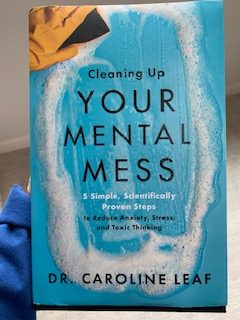If ever there was a book that the world needs right now, this is it
Let me start by saying that I’m not fully on board with the title of this book: Cleaning Up Your Mental Mess (subtitle, 5 Simple, Scientifically Proven Steps to Reduce Anxiety, Stress, and Toxic Thinking), by Dr. Caroline Leaf.
The title suggests that the book is only for people who are struggling. That, IMO, is a mistake.
Back up a couple steps to how I learned about the book. It was a Dave Asprey podcast. Leaf was a guest, and during the interview she mentioned that she’s helped people with traumatic brain injury — people who other medical professionals had written off as permanently disabled — to not only recover from their injuries, but excel (in areas like academics, where highly functioning brain power is a prerequisite).
I thought, whoa. If her techniques are that powerful, imagine what people who aren’t recovering from physical injury could accomplish.
So I didn’t buy this book to deal with anxiety, stress, and toxic thinking. I mean, I’m not perfect and my life doesn’t always run smoothly, but I’ve been around for a while, I’ve done the work, I’ve cultivated coping skills that do the job for me.
In fact, that is kind of the point. I’m not trying to fix huge problems. I’m looking for ways to set and reach stretch goals.
What, exactly, can I accomplish in whatever time I have left on this planet? What seeming limits can I break?
You can grow brain cells — intentionally
What grabbed my attention in the Asprey interview is that Leaf (a neuroscientist and speech pathologist) was an early believer in neuroplasticity. “Early” as in back in the 1980s.
If you’re old enough, you probably know that there was a time when Science told us that the adult brain could not grow new cells. Once we hit a certain age (mid twenties, I guess, or maybe they thought it was late teens) we would supposedly hit our peak number of brain cells. From there, it was all downhill. Over time, our brain cells would start to die off, and since they could never be replaced, we’d lose cognitive function.
We were fated by nature, the Experts intoned, to a sad, lifelong slide toward mental and physical enfeeblement.
Leaf was a practicing neuroscientist during this period. She disagreed with the consensus.
She was right. She proved she was right in her practice.
Cleaning Up Your Mental Mess explains, in detail, the techniques Leaf teaches to help people stimulate their brains to grow new cells and form new neural connections.
How cool is that?
Now let me also say that, if you suffer from anxiety, stress, or similar issues (and if you do, you are far from alone) just go buy the book. (That’s an Amazon affiliate link but you can order it from any bookstore.)
But there is also a lot of material in the book people simply looking to enrich their personal development by integrating the principles of neuroplasticity.
There is some great lay material, for example, on neuroplasticity itself — how it works, what stimulates it, and how it can be detected via changes in brain waves, brain activity, and neurotransmitter levels.
First mind, then brain
There is some terrific insight into the relationship between the mind and the brain. The brain, Leaf explains, arises from the mind — not in any magical sense, but because our thoughts, feelings, and choices literally stimulate neurons to either emerge, grow, and branch or to prune, fade, and disappear.
And the book details the steps that Leaf has developed to help people use neuroplasticity to address a variety of challenges, including: replacing unwanted habits with desirable ones; something she calls “brain building,” which relates to what I referenced earlier about enhancing one’s cognitive abilities; and improving relationships and communications skills.
Writing, it turns out, plays a huge part in her approach. Leaf’s protocol is based on bringing existing thoughts, feelings, and choices into full conscious awareness, and then “re-conceptualizing” those thoughts/feelings/choices as a way to re-shape or replace associated neurons. Writing is useful during each step of the process by encouraging us to unlock suppressed thoughts, consider them, and find new ways to contextualize them. Interestingly, she states that “writing can even improve immune system function,” citing research she’s conducted that showed patients’ cortisol and homocysteine levels drop when they perform her Reflect step, which involves writing.
It makes me wonder what impact journaling has had on my life. I’ve kept a journal since I was a teenager, and while I instinctively turn to it during periods when I feel confused or stressed, or need to make some sort of major life decision. On the other hand, I’ve also thought of journaling as something of a writerly indulgence — a variety of navel-gazing. Perhaps I shouldn’t have been so self-deprecating? Perhaps my lifelong habit of journaling has had a major benefit to my overall well-being …?
One thing is for sure: I’ll be applying Leaf’s program to some of my life goals, and as part of that, I’ll be more deliberate in how I use my journal.
Bottom line? Great book. Highly recommend to anyone who is curious about tackling life’s challenges, whether that means healing from trauma or pushing personal limits.
* * * * *
Pssst. You know who really needs to clean up her mental mess?

Meet Marion Flarey.
She’s out of a job.
Buried in school loan debt. About to be homeless.
And she’s no Rapunzel.
She doesn’t even have long hair.
But she just found an apartment.
And it has a Tower…
Once Upon a Flarey Tale.
Available on Amazon for Kindle or print, or click here to select from other e-formats.
Book 1 of my Marion Flarey Series.
Winner, 2020 Incipere Award for Women’s Fiction, Clean.

